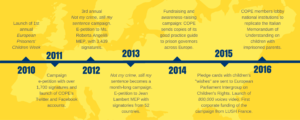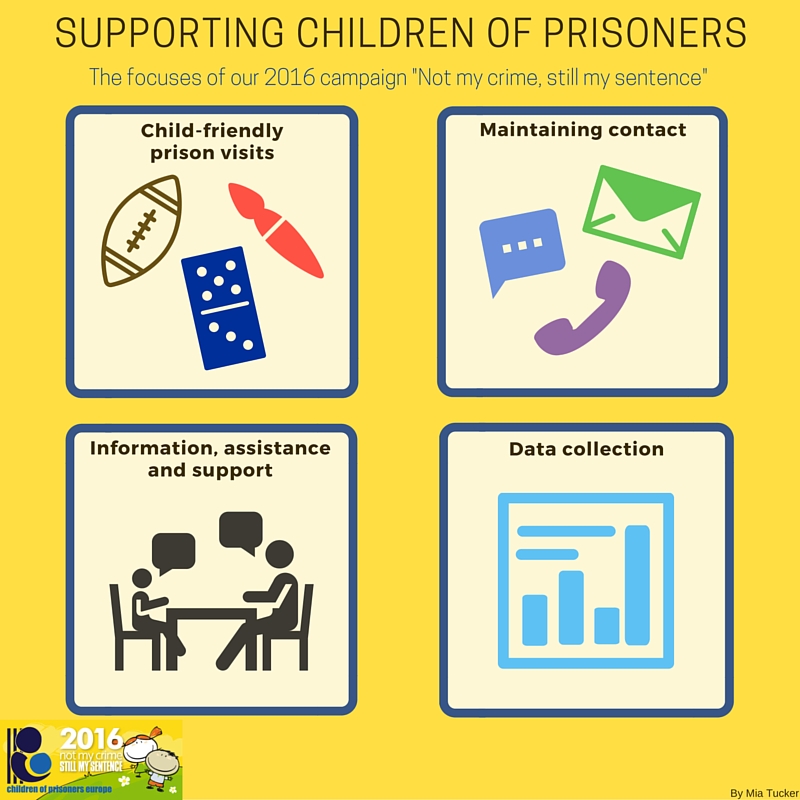Over the years, COPE’s campaign “Not my crime, still my sentence” has become a landmark annual event for all organisations working for the rights of children with imprisoned parents. Launched in 2010 and taken up by many supporters, the campaign is now celebrated annually in 15 countries with the aim of raising awareness about the rights and needs of these children. Thanks to the active participation of members of the COPE network, word about this initiative is spreading quickly. In 2015, the COPE campaign was selected as the Charity Campaign of the Month by The Guardian newspaper. And this year, several new countries, including Poland, Portugal and Argentina, expressed their interest in joining the campaign in the future.
CAMPAIGN 2016
In June 2016, the COPE’s annual campaign was celebrated for the seventh time. This year the main campaign focus was the Memorandum of Understanding, a groundbreaking charter signed in 2014 by COPE’s Italian member organisation Bambinisenzasbarre, the Italian Minister of Justice and the National Ombudsman for Childhood and Adolescence. Drawing heavily on the United Nations Convention on the Rights of the Child, the Memorandum sets out the rights and procedures that are necessary to protect the rights and development of children of imprisoned parents. This charter, applicable in all Italian prisons, was agreed for a period of two years, and work is currently underway to renew it for another two years.
The Memorandum is a milestone for children who have a parent in prison. In the two years since the protocol was signed, new visiting rooms and spaces have been set up in 95% of Italian prisons. Major improvements have also been made in Italy concerning the creation of green spaces inside prisons and additional visiting days, as well as the implementation of better communication mechanisms between children and their incarcerated parents. As such, COPE’s campaign encouraged all its members to spread this example of best practice in their countries. To support this important process, the MoU currently is available in eight different languages. Significant progress to replicate the Memorandum outside of Italy has been made by Croatia and the Netherlands. Argentina is also working to replicate the protocol within that context.
As every year, COPE’s campaign has proved to be a valuable opportunity for targeted initiatives and events to raise awareness of children affected by parental imprisonment. Numerous actions took place across Europe to mark the campaign. For example, Swiss member REPR launched a drawing competition “Dessine-moi une prison” (Draw me a prison) open to children 3-18 years old. In Italy, thanks to collaboration with the Ministry of Justice, prisons held “Open Prisons” programs, which invited schools to organise events such as discussions or green-area meetings involving children of prisoners. COPE also spotlighted the ongoing work of many of our members from the UK, Finland, Italy, Turkey and Belgium.
Each campaign week featured a focus theme to highlight some of the best practices of COPE’s members. The four themes chosen were Child-friendly visits, Maintaining family ties, Information, assistance and support and Data collection. Throughout the month of June, COPE members have been sending their input to COPE and their success stories have been feeding into “country focuses” published by COPE on its website and social media three times a week.
TOOLS USED
In order to reach its target audiences and maximise the action’s impact, COPE prepared different campaign tools. The COPE website continued to be a focal point for all campaign activities, hosting resources such as videos, children’s artwork and news items.
COPE was also very active on Facebook and Twitter, raising awareness on different aspects of the situation of children of prisoners and featuring members’ success stories. In the past month, over 62,000 people were potentially reached via Facebook and Twitter and COPE’s various social media networks gained more than 170 new followers.
The video “It’s time to act”, produced by COPE to target policymakers and other decision-makers, was avidly shared on social media. It sets out the scale of the issues faced by children of imprisoned parents and focuses on specific provisions of the Italian Memorandum of Understanding to highlight the kind of positive steps that can be taken to improve the lives of children of prisoners.
In addition, a campaign circular was created to help COPE members with their lobbying efforts during the month of June. It featured a campaign overview, background information on the Italian Memorandum, description of “It’s time to act” video and tips on action in social media. It also offered several sample letters to be addressed to the Ministry of Justice, Children’s Ombudsman, local MEP, local media and Directors of Prison and Probation Services.
In the run-up to the 2016 campaign, COPE distributed to all 72 members of the European Parliament Intergroup on Children’s Rights painted and hand-written pledge cards from last year’s campaign, where children from six different countries put into words one change they would like to see which would improve their personal experience of parental imprisonment. COPE hopes to work closely with this group of MEPs in the future in strengthening the commitment at a European level to address the needs of children of prisoners in EU countries and beyond.
The COPE campaign, as well as the overall issues relevant for children affected by parental incarceration, was featured in articles across Europe. Examples include an article written in the popular Polish Interia portal and a spotlight article written by Bambinisenzabarre.
SUPPORT FROM POLICYMAKERS
On the eve of the campaign launch, Italian Minister of Justice Andrea Orlando, one of the signatories of the Italian Memorandum of Understanding, addressed a letter to the participants of COPE’s annual conference in Zagreb on 20 May 2016, expressing his support for the network and sharing some of the Italian best practices, as mentioned above.
Of particular note this year was the campaign promotion during the 21st Conference of Directors of Prison and Probation Services of the Council of Europe/Council of Penological Co-operation in the Netherlands on the 14-15 June. COPE President Lucy Gampell gave a keynote speech and member representatives from Switzerland and Norway organised workshops. In addition, COPE’s good practice guide, journal and postcards were distributed among participants.
In a letter addressed to COPE, French MEP Nathalie Griesbeck expressed her support for COPE’s work and campaign and pledged that as a member of the EP Group on Civil Liberties, Justice and Internal Affairs she would follow closely all topics related to children of prisoners.



